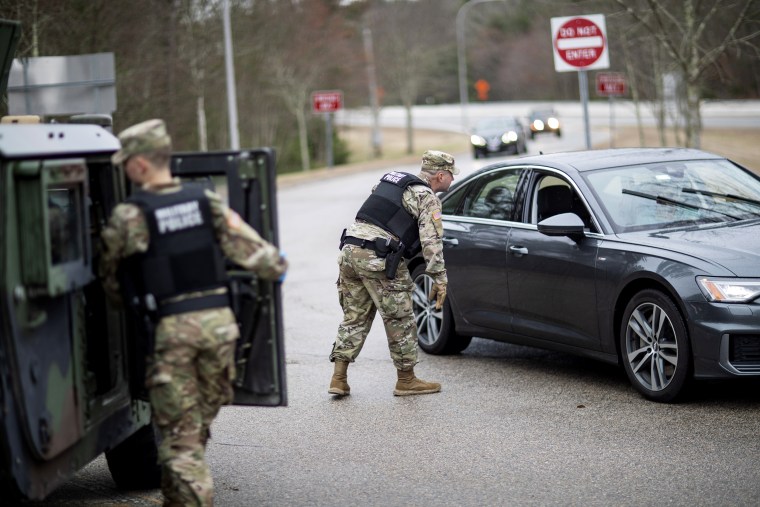How much can the government limit the actions of private individuals during a global health crisis? And specifically, can states quarantine out-of-state travelers? That is one of the big unanswered legal questions raised by the coronavirus crisis.
The world is facing an overwhelming pandemic. While cities, states and countries implement measures to protect the health and safety of their people, they are also pushing the legal boundaries of what governments can do to guard against medical emergencies.
While cities, states and countries implement measures to protect the health and safety of their residents, they are also pushing legal boundaries.
President Donald Trump recently backed away from enforcing a quarantine in the New York, New Jersey and Connecticut area. But a number of states are trying to protect their own residents by quarantining anyone coming into the state, whether they be residents or out-of-state visitors.
These quarantines appear to come in three main flavors.
First, there are orders to quarantine out-of-state travelers. At the end of March, the governors of Rhode Island and Delaware (both Democrats) and the governors of Vermont and West Virginia (both Republicans) signed executive orders requiring quarantines of all out-of-state visitors, with some exceptions for those entering for nonwork purposes or who are just passing through.
Second, there are orders requiring both residents and non-residents arriving in the state to self-quarantine. To date, Alaska, Hawaii, Massachusetts and Nevada have imposed similar restrictions on people trying to enter or re-enter.
Third, there are orders requiring visitors from certain states that have seen a large number of coronavirus cases to quarantine. The governors of Florida, Texas, South Carolina and Oklahoma (all Republicans) have issued executive orders requiring those entering from coronavirus hot spots to self-quarantine. Kansas' Health and Environment Department and North Dakota's Health Department have similarly instituted self-quarantines for residents arriving from certain states.
These actions bring up an important question of where state power ends and federal power begins.
States and localities have broad police powers to protect public health. That is why cities and states have the power to implement shelter-in-place or stay-at-home orders. State governments also have the power to limit the activities of private individuals within their jurisdictions, such as requiring them to quarantine and isolate, as long as they do not use the power in a way that violates the U.S. Constitution.
Legally, where does this leave us? In one corner, we have the states, armed with their power to protect the health, safety and welfare of their residents. In the other corner, we have the federal government, charged with regulating interstate commerce and protecting federal constitutional rights like the right to travel.
First, there is the not insignificant issue of the federal right to travel. In this situation, we are basically talking about the right of citizens to travel to and from states and the right of citizens of one state to enjoy the "privileges and immunities" of the state they are visiting. Very generally, the privileges and immunities clause prohibits states from discriminating against out-of-state visitors, but there are plenty of exceptions. There has not been a case explaining whether one of those exceptions includes the ability to force out-of-state visitors to self-quarantine.
Second, there is the looming issue of the federal government's exclusive power to regulate interstate commerce. The governor of Rhode Island has argued that her order is narrowly tailored to protect her residents while not impeding interstate commerce. This may be why there is a specific carve-out for those entering the state for work purposes. It is not clear whether this carve-out would withstand constitutional scrutiny.
Third, there is some concern about protecting individuals' Fourth Amendment rights to be free of unreasonable searches and seizures, particularly with respect to Rhode Island's order. Specifically, there may be a question as to whether having an out-of-state license plate gives rise to probable cause to allow law enforcement to stop a car and question the driver.
This is a new world of lockdowns and quarantines and self-isolation, shelter-in-place and safer-at-home orders. Only a month ago, many Americans would have greeted the idea of the government's shutting down private businesses, restricting private movements and generally prohibiting private actions with disbelief. Many of us wrongly would have imagined these as actions taken by an authoritarian regime, not a government charged with ensuring life, liberty and the pursuit of happiness.
We are now, however, living in a new social, medical and legal paradigm. One of the biggest legal questions before us is how the government can restrict our movements and what legal recourse we have. A secondary question is which government, if any, has the authority to control our actions — the federal government, the states and/or localities.
The quarantine orders, implicating both state residents and out-of-state visitors, involve both of these legal questions. The issues will not be sorted out today, tomorrow or likely even during this first surge of coronavirus infections. But because most experts agree that we may see waves of infections until there is a vaccine, we may have a much better sense when the next wave of the coronavirus hits of how governments can limit the actions of their residents.
Judges may be loath to second-guess the judgment of governors and mayors whose stated aim is to protect their residents from serious illness, but they will eventually have to help define the boundaries of how far governments can go to protect their residents.



